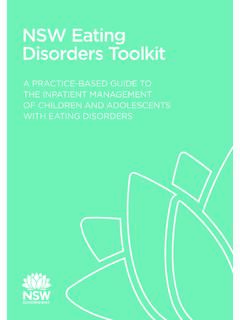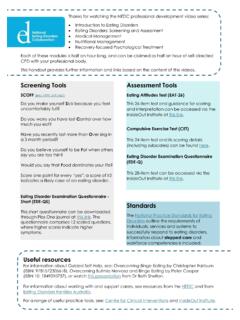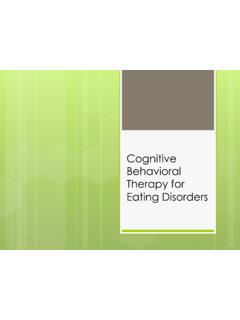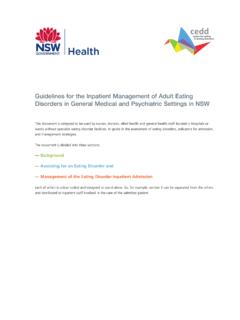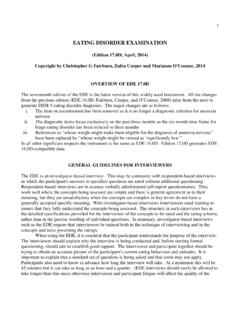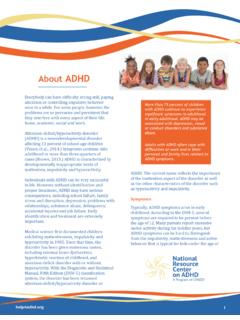Transcription of EDE-Q Eating Disorder Examination Questionnaire …
1 Eating Disorder Examination Questionnaire ( EDE-Q ) 2008 Christopher G Fairburn and Sarah Beglin 1 Eating Disorder Examination Questionnaire ( EDE-Q ) Instructions: The following questions are concerned with the past four weeks (28 days) only. Please read each question carefully. Please answer all the questions. Thank you. Questions 1 to 12: Please circle the appropriate number on the right. Remember that the questions only refer to the past four weeks (28 days) only. ON HOW MANY OF THE PAST 28 DAYS .. NO DAYS 1-5 DAYS 6-12 DAYS 13-15 DAYS 16-22 DAYS 23-27 DAYS EVERY DAY 1 Have you been deliberately trying to limit the amount of food you eat to influence your shape or weight (whether or not you have succeeded)? 0 1 2 3 4 5 6 2 Have you gone for long periods of time (8 waking hours or more) without Eating anything at all in order to influence your shape or weight? 0 1 2 3 4 5 6 3 Have you tried to exclude from your diet any foods that you like in order to influence your shape or weight (whether or not you have succeeded)?
2 0 1 2 3 4 5 6 4 Have you tried to follow definite rules regarding your Eating (for example, a calorie limit) in order to influence your shape or weight (whether or not you have succeeded)? 0 1 2 3 4 5 6 5 Have you had a definite desire to have an empty stomach with the aim of influencing your shape or weight? 0 1 2 3 4 5 6 6 Have you had a definite desire to have a totally flat stomach? 0 1 2 3 4 5 6 7 Has thinking about food, Eating or calories made it very difficult to concentrate on things you are interested in (for example, working, following a conversation, or reading)? 0 1 2 3 4 5 6 8 Has thinking about shape or weight made it very difficult to concentrate on things you are interested in (for example, working, following a conversation, or reading)? 0 1 2 3 4 5 6 9 Have you had a definite fear of losing control over Eating ? 0 1 2 3 4 5 6 10 Have you had a definite fear that you might gain weight? 0 1 2 3 4 5 6 11 Have you felt fat?
3 0 1 2 3 4 5 6 12 Have you had a strong desire to lose weight? 0 1 2 3 4 5 6 Eating Disorder Examination Questionnaire ( EDE-Q ) 2008 Christopher G Fairburn and Sarah Beglin2 Questions 13-18: Please fill in the appropriate number in the boxes on the right. Remember that the questions only refer to the past four weeks (28 days). 13 Over the past 28 days, how many times have you eaten what other people would regards as an unusually large amount of food (given the circumstances)? 14 .. On how many of these times did you have a sense of having lost control over your Eating (at the time you were Eating )? 15 Over the past 28 days, on how many DAYS have such episodes of overeating occurred ( you have eaten an unusually large amount of food and have had a sense of loss of control at the time)? 16 Over the past 28 days, how many times have you made yourself sick (vomit) as a means of controlling your shape or weight? 17 Over the past 28 days, how many times have you taken laxatives as a means of controlling your shape or weight?
4 18 Over the past 28 days, how many times have you exercised in a driven or compulsive way as a means of controlling your weight, shape or amount of fat, or to burn off calories Questions 19 to 20: Please circle the appropriate number. Please note that for these questions the term binge Eating means Eating what others would regard as an unusually large amount of food for the circumstances, accompanied by a sense of having lost control over Eating . ON HOW MANY OF THE PAST 28 DAYS .. NO DAYS 1-5 DAYS 6-12 DAYS 13-15 DAYS 16-22 DAYS 23-27 DAYS EVERY DAY 19 Over the past 28 days, on how many days have you eaten in secret (ie, furtively)?..Do not count episodes of binge eating0 1 2 3 4 5 6 NONE OF THE TIMES A FEW OF THE TIMES LESS THAN HALF HALF OF THE TIMES MORE THAN HALF MOST OF THE TIME EVERY TIME 20 On what proportion of the times that you have eaten have you felt guilty (felt that you ve done wrong) because of its effect on your shape or weight?
5 Do not count episodes of binge Eating . 0 1 2 3 4 5 6 Eating Disorder Examination Questionnaire ( EDE-Q ) 2008 Christopher G Fairburn and Sarah Beglin 3 In the past 28 NOT AT ALL NOT MUCH A LITTLE BIT MODER- ATELY QUITE A BIT VERY MUCH MARKED- LY 21 How concerned have you been about other people seeing you eat? (Do not count episodes of binge Eating ) 0 1 2 3 4 5 6 22 Has your weight influenced how you think about (judge) yourself as a person? 0 1 2 3 4 5 6 23 Has your shape influenced how you think about (judge) yourself as a person? 0 1 2 3 4 5 6 24 How much would it have upset you if you had been asked to weigh yourself once a week (no more, or less, often) for the next four weeks? 0 1 2 3 4 5 6 25 How dissatisfied have you been with your weight? 0 1 2 3 4 5 6 26 How dissatisfied have you been with your shape? 0 1 2 3 4 5 6 27 How uncomfortable have you felt seeing your body (for example, seeing your shape in the mirror, in a shop window reflection, while undressing or taking a bath or shower)?
6 0 1 2 3 4 5 6 28 How uncomfortable have you felt about others seeing your shape or figure (for example, in communal changing rooms, when swimming, or wearing tight clothes)? 0 1 2 3 4 5 6 What is your weight at present? (Please give your best estimate.): _____ What is your height? (Please give your best estimate.): _____ If female: Over the past three to four months have you missed any menstrual periods?: Yes No If so, how many?: _____ Have you been taking the pill ?: Yes No Eating Disorder Examination Questionnaire ( EDE-Q ) 2008 Christopher G Fairburn and Sarah Beglin Scoring The EDE, and its self-report version, the EDE-Q , generate two types of data. First, they provide frequency data on key behavioural features of Eating disorders in terms of number of episodes of the Behaviour and in some instances number of days on which the behaviour has occurred.
7 Second, they provide subscale scores reflecting the severity of aspects of the psychopathology of Eating disorders . Global Score To obtain an overall or global score, the four subscales scores are summed and the resulting total divided by the number of subscales ( four). Subscales The subscales are Restraint, Eating Concern, Shape Concern and Weight Concern. To obtain a particular subscale score, the ratings for the relevant items (listed below) are added together and the sum divided by the total number of items forming the subscale. If ratings are only available on some items, a score may nevertheless be obtained by dividing the resulting total by the number of rated items so long as more than half the items have been rated. Subscale scores are reported as means and standard deviations. Restraint 1 Restraint over Eating 2 Avoidance of Eating 3 Food avoidance 4 Dietary Rules 5 Empty stomach Eating Concern 7 Preoccupation with food, Eating or calories 9 Fear of losing control over Eating 19 Eating in secret 21 Social Eating 20 Guilt about Eating Shape Concern 6 Flat stomach 8 Preoccupation with shape or weight 23 Importance of shape 10 Fear of weight gain 26 Dissatisfaction with shape 27 Discomfort seeing body 28 Avoidance of exposure 11 Feelings of fatness Weight Concern 22 Importance of weight 24 Reaction to prescribed weighing 8 Preoccupation with shape or weight 25 Dissatisfaction with weight 12 Desire to lose weight Eating Disorder Examination Questionnaire ( EDE-Q ) 2008 Christopher G Fairburn and Sarah Beglin Community Norms The data below are from a community-based sample of 243 young women assessed using the EDE and EDE-Q (see Fairburn and Beglin, 1994).
8 Measure Mean SD N EDE interview Global EDE (4 subscales) 243 Restraint subscale 243 Eating Concern subscale 243 Shape Concern subscale 243 Weight Concern subscale 243 EDE Q Global EDE (4 subscales) 241 Restraint subscale 241 Eating Concern subscale 241 Shape Concern subscale 241 Weight Concern subscale 241

